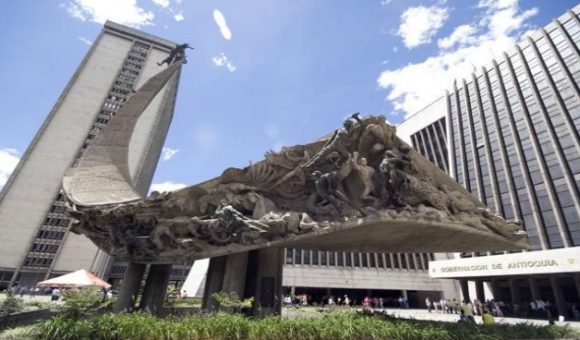Medellin’s Short- and Long-Term Municipal Bonds Win ‘Stable’ Ranking from Wall Street

Wall Street bond rater Fitch Ratings announced June 12 that it affirmed the city of Medellin’s long-and short-term debt at relatively favorable “AAA (col)” and “F1 + (col)” ratings.
“The outlook for the long-term rating is ‘stable,’” according to Fitch. “The affirmation of the ratings took into account the situation of economic stress as a consequence of the contingency derived from the Coronavirus,” according to the analyst.
“Furthermore, it reflects Fitch’s expectation that Medellín will preserve stable budget performance and adequate debt with an expected repayment ratio that will be in a range greater than five times (5x) and debt service coverage that will be in a range 1x to 1.2x in the medium- term, in line with the results of the previous review.
“Although the most recent financial information available from Medellín may not yet reflect any financial deterioration, variations in the behavior of income and spending could materialize in the following weeks or months as the impact of the Coronavirus and less dynamism on economic activity is perceived,” the analyst cautioned.
Unlike some Colombian cities, “Medellin’s operating income structure has a relatively low dependence on national transfers,” according to Fitch.
“Medellín’s tax revenue represented on average 45.9% of operating revenue in the last five years (2015 to 2019) and showed an average annual growth rate of 6.2%. Medellín presents in its structure of this type of income a participation of 40.8% of the unified property tax (IPU) and 35.2% of the industry and commerce tax (ICA).
“Both have shown low volatility in recent years, thanks to the municipality’s fiscal management model and a positive taxpayer payment culture. However, these rents are expected to drop considerably as a result of quarantine restrictions in the municipality due to the coronavirus pandemic.
“Total ownership of Empresas Públicas de Medellín (EPM) has been a key factor in the municipality’s financial performance and an outstanding source of resources, since a significant amount of ordinary and special financial surplus transferred to Medellín [from EPM] has increased its financial flexibility to make capital expenditures.
“This also places Medellin in an incomparable position with respect to other cities in the face of the current health crisis. The financial surpluses [EPM] delivered to Medellín in 2019 reached COP$1.3 trillion [US$344 million] or 55% of the company’s 2018 profits.
“Medellín has financial autonomy and the power to adjust the rates for most of its taxes within the limits defined by the national government. Therefore, in the event of a further need to increase its own income, it is expected that Medellin could cover [via a special tax hike] at least 50% of a reasonably expected decrease in income [from Coronavirus economic downturns].
“In addition, the rates of the IPU [property tax] in the municipality are below the legal limit and the municipal taxpayers have a relatively high affordability to address possible rate increases,” Fitch’s report notes.
Meanwhile, during the last five years, “Medellín’s tax collections have a positive trend due to good management of the fiscal model, a culture of payment by taxpayers and the economic performance of the region,” according to the analysis.
“Despite the extraordinary expenses that will be incurred to contain the health contingency, Fitch forecasts that operating expenses will remain under control for the rest of the current administration and estimates an average annual growth of 5.7% for the period 2020 to 2024. To meet the contingency, Medellín has released budget resources for COP$236 billion [US$62 million], equivalent to 4.2% of total revenues generated in 2019.
“At the end of 2019, the balance of Medellín’s debt was COP$1.9 trillion [US$503 million]. About 34.6% of Medellín’s direct debt was denominated in foreign currency — contracted with the French Development Agency for the Medellín ‘green-corridor’ program — and about 65.3% was linked to a variable interest rate.
“The municipality has a current issue of internal public-debt bonds that represent 13.2% of its direct debt and correspond to a sixth bond issue for COP$248 billion [US$66 million], whose maturities are in tranches for 2024 and 2044.
“Fitch considers that Medellín has better liquidity management, which is reflected in a stronger liquidity position and greater access to short or long-term loans with local banks, whose counterparty is rated ‘BBB-’. In addition, Medellin can access Treasury credits for up-to-one-twelfth of its current income, which must be paid at the end of the term,” the analysis adds.
What’s more, “Fitch includes in its analysis the way in which Medellín recognizes the obligation with the national government to finance the original infrastructure of the Medellín Metro and considers it as an inter-governmental obligation. Thus, Fitch performs a complementary calculation, called the improved repayment ratio, which excludes this obligation from the debt sustainability metrics to estimate a potential improvement over the individual credit profile (ICP).
“Currently, the Medellín ICP is strong enough to support current ratings, so this improvement is not applied,” the analysis concludes.
















